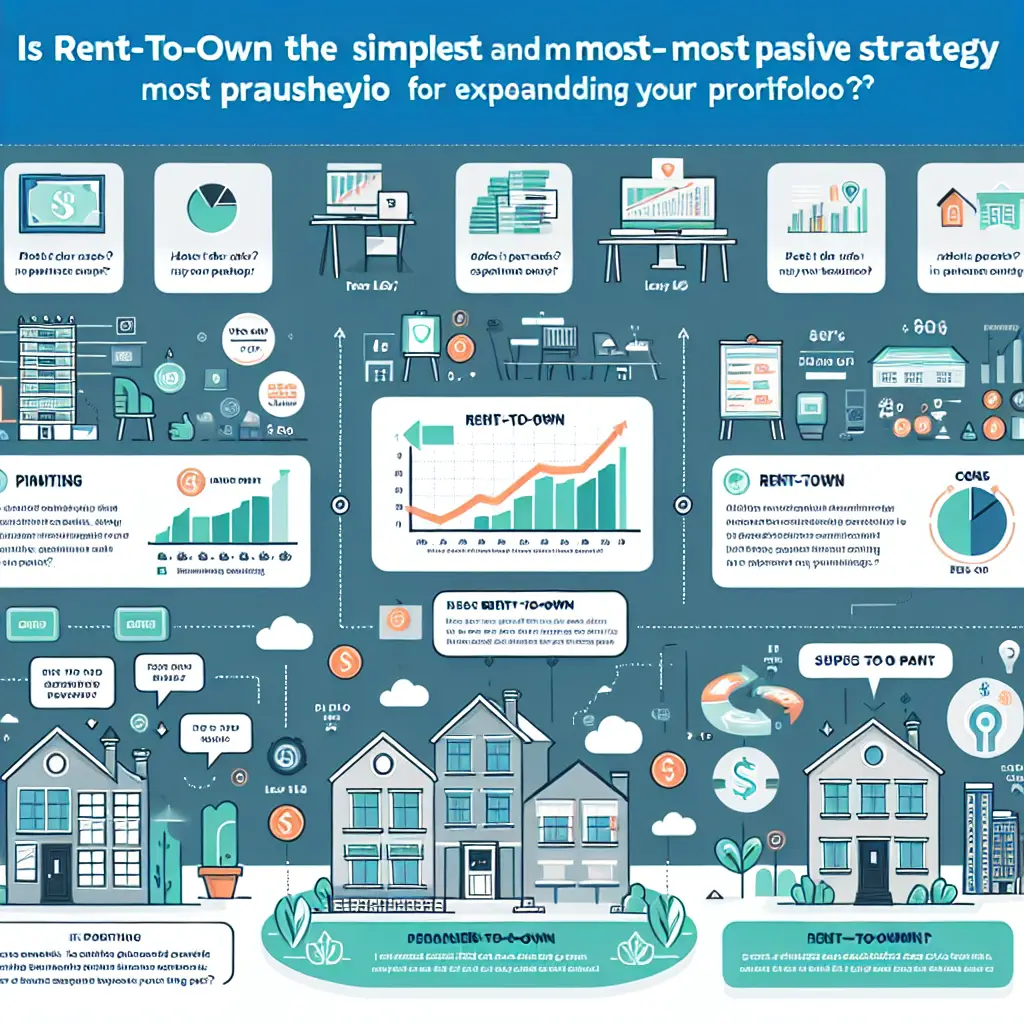-
Table of Contents
- Is Rent-to-Own the Simplest and Most Passive Strategy for Expanding Your Portfolio?
- Understanding Rent-to-Own Agreements
- How Rent-to-Own Works
- Benefits of Rent-to-Own for Investors
- Comparing Rent-to-Own with Other Investment Strategies
- Traditional Rental Properties
- Fix-and-Flip
- Real Estate Investment Trusts (REITs)
- Potential Pitfalls of Rent-to-Own Agreements
- Case Studies: Success Stories and Lessons Learned
- Case Study 1: Building Equity Over Time
- Case Study 2: Navigating Market Fluctuations
- FAQs: Common Questions About Rent-to-Own Agreements
- What happens if the tenant decides not to purchase the property?
- Are rent-to-own agreements legally binding?
- Can the purchase price be negotiated during the lease term?
- Conclusion: Is Rent-to-Own the Right Strategy for You?
Is Rent-to-Own the Simplest and Most Passive Strategy for Expanding Your Portfolio?

In the ever-evolving world of real estate investment, finding the right strategy to expand your portfolio can be challenging. One approach that has gained traction is the rent-to-own model. But is it truly the simplest and most passive strategy for expanding your portfolio? This article delves into the intricacies of rent-to-own agreements, exploring their benefits, potential pitfalls, and how they compare to other investment strategies.
Understanding Rent-to-Own Agreements
Rent-to-own agreements, also known as lease-option agreements, offer a unique pathway to homeownership. These contracts allow tenants to rent a property with the option to purchase it at a later date. This model can be particularly appealing for those who may not currently qualify for a mortgage but aspire to own a home in the future.
How Rent-to-Own Works
In a typical rent-to-own agreement, the tenant pays an option fee upfront, which grants them the right to purchase the property at a predetermined price within a specified period. During the lease term, a portion of the monthly rent may be credited towards the purchase price. This arrangement provides tenants with the opportunity to build equity while renting.
Benefits of Rent-to-Own for Investors
- Steady Income Stream: Rent-to-own agreements provide a consistent rental income, which can be particularly beneficial for investors seeking passive income.
- Potential for Higher Returns: The option fee and higher-than-market rent can result in increased returns compared to traditional rental properties.
- Reduced Vacancy Rates: Tenants in rent-to-own agreements are often more committed to the property, leading to lower vacancy rates and reduced turnover costs.
Comparing Rent-to-Own with Other Investment Strategies
Traditional Rental Properties
Traditional rental properties involve purchasing a property and renting it out to tenants. While this strategy can provide a steady income stream, it also comes with responsibilities such as property maintenance, tenant management, and potential vacancies.
Fix-and-Flip
The fix-and-flip strategy involves purchasing distressed properties, renovating them, and selling them for a profit. While this approach can yield significant returns, it requires substantial time, effort, and expertise in property renovation and market trends.
Real Estate Investment Trusts (REITs)
REITs offer a more hands-off approach to real estate investment. By purchasing shares in a REIT, investors can gain exposure to a diversified portfolio of properties without the responsibilities of property management. However, REITs may not provide the same level of control and potential returns as direct property ownership.
Potential Pitfalls of Rent-to-Own Agreements
While rent-to-own agreements offer several benefits, they also come with potential risks and challenges:
- Tenant Default: If the tenant fails to exercise the purchase option or defaults on the lease, the investor may need to find a new tenant or buyer, potentially leading to vacancies and lost income.
- Market Fluctuations: Changes in the real estate market can impact the property’s value, potentially affecting the profitability of the rent-to-own agreement.
- Legal Complexities: Rent-to-own agreements can be legally complex, requiring careful drafting and review to ensure compliance with local laws and regulations.
Case Studies: Success Stories and Lessons Learned
To illustrate the potential of rent-to-own agreements, let’s explore a few case studies:
Case Study 1: Building Equity Over Time
John, an investor, entered into a rent-to-own agreement with a tenant who aspired to buy a home but lacked the necessary credit score. Over three years, the tenant diligently paid rent, with a portion credited towards the purchase price. At the end of the lease term, the tenant secured financing and purchased the property, providing John with a profitable return on his investment.
Case Study 2: Navigating Market Fluctuations
Sarah, another investor, faced challenges when the real estate market declined during the lease term of her rent-to-own agreement. Despite the market downturn, Sarah’s tenant remained committed to purchasing the property. By the end of the lease term, the market had recovered, and the tenant successfully bought the home, resulting in a positive outcome for both parties.
FAQs: Common Questions About Rent-to-Own Agreements
What happens if the tenant decides not to purchase the property?
If the tenant chooses not to exercise the purchase option, the investor retains the option fee and any rent credits. The investor can then seek a new tenant or buyer for the property.
Are rent-to-own agreements legally binding?
Yes, rent-to-own agreements are legally binding contracts. It is essential to have the agreement reviewed by a legal professional to ensure compliance with local laws and regulations.
Can the purchase price be negotiated during the lease term?
The purchase price is typically set at the beginning of the lease term and is not subject to negotiation. However, some agreements may include provisions for adjusting the price based on market conditions.
Conclusion: Is Rent-to-Own the Right Strategy for You?
Rent-to-own agreements offer a unique and potentially lucrative strategy for expanding your real estate portfolio. With benefits such as steady income, higher returns, and reduced vacancy rates, this approach can be an attractive option for investors seeking passive income. However, it is essential to carefully consider the potential risks and challenges, including tenant default, market fluctuations, and legal complexities.
Ultimately, the decision to pursue a rent-to-own strategy will depend on your investment goals, risk tolerance, and market conditions. By conducting thorough research and seeking professional advice, you can determine whether rent-to-own is the simplest and most passive strategy for expanding your portfolio.
If you’re interested in exploring rent-to-own opportunities or other mortgage options, contact a correspondent lender in our network to discuss your investment goals and find the best strategy for your needs.








